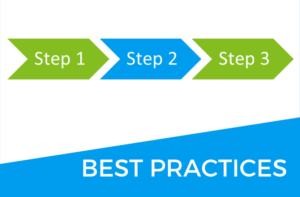 Business best practices are nothing more than proven business processes, procedures, or systems. And, what is the critical business growth factor for building a self-sustaining business – systems.
Business best practices are nothing more than proven business processes, procedures, or systems. And, what is the critical business growth factor for building a self-sustaining business – systems.
You’ve probably had people tell you, “you need to create systems to grow,” but many business owners don’t know how. The blog post titled 5 Steps to Establishing a Repeatable and Sustainable Business outlines the process for building business best practices.
 However, many owners don’t have time or patience for creating systems or implementing best-practices. So, DE, Inc. offers best-practices consulting to help if you are one of these owners.
However, many owners don’t have time or patience for creating systems or implementing best-practices. So, DE, Inc. offers best-practices consulting to help if you are one of these owners.
Why You Want Business Best Practices
The benefit of having business best practices include:
- Speeds up delivery
- Improves quality
- Allows you to delegate
- Reduces cost
- Increase productivity
All these things help you accelerate growth and increase profitability. So why wouldn’t you focus on implementing best practices in your business?
Most owners say, “I don’t have time!” Which is why our best practices consulting makes so much sense. We’ll come do it for you!
Ready-to-Use Business Best Practices
 At DE, Inc. we’ve helped dozens of small business with increasing their profitability and business growth, and through it all we’ve created a standard set of business practices that will work for just about any business. A consultant comes in and tailors these best practices, so they fit your current operating procedures and company culture where it makes sense.
At DE, Inc. we’ve helped dozens of small business with increasing their profitability and business growth, and through it all we’ve created a standard set of business practices that will work for just about any business. A consultant comes in and tailors these best practices, so they fit your current operating procedures and company culture where it makes sense.
Here are some of the ready-to-use business best practices offered:
- strategic & business planning
- how to prepare for quality hiring
- monthly owner’s meeting
- reviewing financial statements
- monitoring operational performance
- sales forecasting and planning by the numbers
- how to evaluate and improve pricing
- change management
- issue tracking and resolution
- managing internal or external projects
- product/service development
- performance-based employee reviews
- vendor management
- creating strategic alliance partnerships
- implementing customer relationship management systems (CRM)
- software package evaluation and implementation
- marketing strategy develop
- marketing planning (and all the sub-processes necessary for market planning)
- digital marketing management
- training development
- employee and customer on-boarding
- solution evaluation for better decision making
- conflict resolution
- leadership
Don’t see what you need on the list? Ask!!! We’ve probably seen it before. Just contact us.

